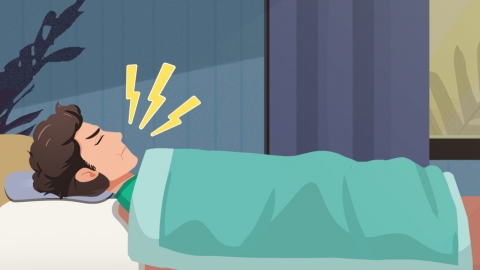Male night sweats during sleep: what does it mean?
Male night sweats during sleep may be caused by high environmental temperature, eating before sleep, significant mental stress, tuberculosis, hyperthyroidism, and other factors. Appropriate management strategies can be selected based on specific situations. If physical discomfort occurs, it is recommended to seek medical attention promptly and follow medical advice for treatment.

1. High Environmental Temperature: Excessively high sleeping temperatures can cause the body to sweat to dissipate heat, resulting in night sweats. Adjust the indoor temperature to a comfortable range, generally 22-26°C, and choose an appropriately thick blanket based on the season and room temperature to maintain a cool, breathable sleeping environment and reduce sweating.
2. Eating Before Sleep: Consuming spicy or hot beverages and other stimulating foods before sleep can stimulate sympathetic nerve activity, causing night sweats. It is recommended to avoid strenuous exercise 2-3 hours before bedtime, eat light meals in the evening, avoid consuming stimulating foods, and allow the body sufficient time to calm down to reduce occurrences of night sweats.
3. High Mental Stress: Long-term anxiety and tension can interfere with nervous system function, leading to sympathetic nerve dysfunction during sleep and causing night sweats. Relax the mind and body through meditation, deep breathing, yoga, and other methods, engage in appropriate outdoor activities during the day to relieve stress, maintain a positive mindset, and improve night sweats.
4. Tuberculosis: Caused by infection with Mycobacterium tuberculosis, the bacteria and its toxins stimulate the human immune system, leading to symptoms such as fever and night sweats, often occurring after falling asleep and stopping upon waking. It may also be accompanied by symptoms like coughing, sputum production, fatigue, and weight loss. Patients can take medications such as isoniazid tablets, rifampin capsules, and pyrazinamide tablets under a doctor's guidance to alleviate symptoms.
5. Hyperthyroidism: Excessive secretion of thyroid hormones leads to increased metabolism, sympathetic nerve excitation, and increased heat production, causing excessive sweating, including night sweats. Common accompanying symptoms include palpitations, hand tremors, heat intolerance, increased appetite, and weight loss. Patients can follow medical advice to take medications such as methimazole tablets, propylthiouracil tablets, and propranolol tablets to relieve discomfort.
Maintaining a positive and optimistic attitude and engaging in appropriate physical exercise can also help reduce anxiety and improve sleep quality.




